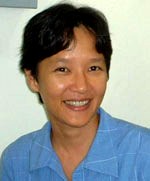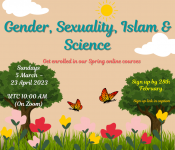MY EXPERIENCE OF THE CSBR SEXUALITY INSTITUTE AS A TRAINER
by tan beng hui – Fiesta Feminista, Malaysia
 Many years ago, I was quite perplexed when I heard a friend refer to lesbians as lesbian women‘. I remember thinking, ―Strange… if lesbians aren‘t women, what else could they be I was convinced that the use of the word woman‘ was redundant since by definition, lesbians had to be women-loving-women‘.
Many years ago, I was quite perplexed when I heard a friend refer to lesbians as lesbian women‘. I remember thinking, ―Strange… if lesbians aren‘t women, what else could they be I was convinced that the use of the word woman‘ was redundant since by definition, lesbians had to be women-loving-women‘.
I since discovered that I had little ability then to think beyond what the dominant discourse on gender told me. After all, the struggle at the time had been about asserting the distinction between biological sex and socially constructed gender. Those challenges aside, some of us now understand how this struggle also inadvertently contributed towards a binary view of gender, one which reduced the meaning of the term to men and women, and in the process, exclude those who may have fitted into both or neither.
Like gender‘, the term sexuality‘ has also had a history of being narrowly grasped by activists of all persuasions. For those dealing with rape, their framework of sexuality was largely confined to keeping women‘s bodies free from violence. On the other hand, those addressing maternal health, abortion, or contraception would rarely adopt a position beyond sexual and reproductive health and rights. At some point – perhaps in the hope of reversing years of silence and discrimination – sexuality was automatically assumed to mean sexual orientation or preference.
The recently concluded 3rd CSBR Sexuality Institute provided 21 activists working in different Muslim contexts with an opportunity to revisit and re-contemplate the concepts of gender and sexuality. Sessions comprising a combination of lectures, small group discussions, role-play, film, and even song and theatre were used to present and explore theory and practice.
One objective was to widen how gender and sexuality were understood. Specifically, thinking outside the box when using labels like man‘, woman‘, gay‘, lesbian‘, bisexual‘, transsexual‘, transgendered‘, intersex‘, etc. As well, having greater clarity in what meanings these terms may hold for different people. Participants were also encouraged to view gender and sexuality holistically – as opposed to treating them discretely with little or no connections.
Being part of this Institute, I found it amazing how much progress has been made in this regard. Just twenty years ago (or less depending on one‘s social, economic or geographic location), the opportunity to learn about such matters – what more being able to sit together in a room of like-minded activists in discussion and debate – would have been unimaginable for the majority. Had it presented itself, I might not have been so quick in concluding like I did, that all lesbians had to be women!
For many reasons ranging from efforts of sexuality advocates locally and globally to the politics of funding, there has been a proliferation of courses within the last decade, leaving those pursuing knowledge relating to gender and sexuality spoilt for choice. The CSBR Sexuality Institute may have been one of many initiatives that emerged out of these developments, but over the last three years, it has also distinguished itself from the others in the following ways.
For one, the Institute has a unique focus on those living in Muslim societies. This is driven by a belief that apart from the difficulties in addressing issues of gender and sexuality, efforts have to be negotiated through an additional layer of challenges that arise out of the politicization of religion: fundamentalism‘ and increasingly, Islamophobia.
At the same time, it isn‘t presumed that these experiences are homogenous. Neither is a blanket solution prescribed for all. The selection of a diverse group of participants – from Asia, the Middle East and Africa, with an assortment of identities and working backgrounds – serves as a reminder that those living in or among Muslim communities may share similar problems but not necessarily the same analytical lens or strategies for confronting these.
Recognizing that non-Muslims too are affected by these same challenges, albeit in differing degrees, the Institute welcomes the possibility of their inclusion, hence consciously extends the frontiers of solidarity building.
Indeed, another distinguishing feature is how the Institute‘s emphasis on promoting scholarship is matched by a desire to strengthen networking. A key consideration is to bring together activists for the purpose of engaging, challenging and learning from each other. This is also why a significant portion of time is dedicated to the sharing of experiences, in particular those relating to strategies for advocacy.
That the Institute has had a positive impact on many who have been through its doors is amply clear from the feedback received. I have been privileged to be a part of its journey so far, and hope to be able to support it for many more years to come. However, its continued success (and existence) lies very much in the hands of the network it serves.
beng hui was a trainer at the CSBR Sexuality Institute in 2009 and 2010. She wishes to thank both the participants who gave so generously of themselves, and her fellow trainers for the many insights she gained.
beng hui was a trainer at the CSBR Sexuality Institute in 2009 and 2010. She wishes to thank both the participants who gave so generously of themselves, and her fellow trainers for the many insights she gained.


